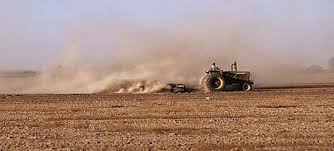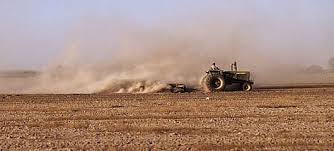
Scientists warn that more than one third of the world’s arable land has been lost in the last 40 years due to due to erosion or pollution and there are potential disastrous consequences for global demand for food soars.
The world has lost nearly 33% of the adequate or high-quality food-producing land in the last few decades due to pollution at a rate that is far greater than the speed at which nature could replenish the diminishing soil quality.
The loss was “catastrophic” and the trend close to being irretrievable without major changes to agricultural practices, says the University of Sheffield’s Grantham Center for Sustainable Futures which undertook the study. The study arrived at the conclusions after analyzing various pieces of research published over the past decade.
The study found out that the erosion is occurring at a pace of up to 100 times greater than the rate of soil formation due to the continual ploughing of fields, combined with heavy use of fertilizers which has degraded soils across the world.
“You think of the dust bowl of the 1930s in North America and then you realize we are moving towards that situation if we don’t do something,” said Duncan Cameron, professor of plant and soil biology at the University of Sheffield.
“We are increasing the rate of loss and we are reducing soils to their bare mineral components,” he said.
“We are creating soils that aren’t fit for anything except for holding a plant up. The soils are silting up river systems – if you look at the huge brown stain in the ocean where the Amazon deposits soil, you realize how much we are accelerating that process. We aren’t quite at the tipping point yet, but we need to do something about it. We are up against it if we are to reverse this decline,” he added.
Continual disturbance for crop planting and harvesting has resulted in the loss of structure of the soil resulting in the erosion of soil. The soil fails to bind effectively when the soil is repeatedly turned over and it is exposed to oxygen and its carbon is released into the atmosphere. The role of the soil as a buffer to floods and a fruitful base for plants is neutralized due to the loss of integrity which impacts soil’s ability to store water.
Weather events fueled by global warming would have the potential to wash away the degraded soils which become vulnerable to the natural elements.
Researchers are presenting the new research at the climate talks in Paris.
This decline in arable land has occurred when there is a rising demand in the world for food. In order to feed an anticipated population of 9 billion people, it is estimated that the world will need to grow 50% more food by 2050. This increase in food production will primarily be met by the developing countries according to the UN’s Food and Agriculture Organization.
A number of remedies to soil loss, including recycling nutrients from sewerage, using biotechnology to wean plants off their dependence upon fertilizers, and rotating crops with livestock areas to relieve pressure on arable land have been proposed y the academics behind the University of Sheffield study.
(Source:www.theguardian.com)
The world has lost nearly 33% of the adequate or high-quality food-producing land in the last few decades due to pollution at a rate that is far greater than the speed at which nature could replenish the diminishing soil quality.
The loss was “catastrophic” and the trend close to being irretrievable without major changes to agricultural practices, says the University of Sheffield’s Grantham Center for Sustainable Futures which undertook the study. The study arrived at the conclusions after analyzing various pieces of research published over the past decade.
The study found out that the erosion is occurring at a pace of up to 100 times greater than the rate of soil formation due to the continual ploughing of fields, combined with heavy use of fertilizers which has degraded soils across the world.
“You think of the dust bowl of the 1930s in North America and then you realize we are moving towards that situation if we don’t do something,” said Duncan Cameron, professor of plant and soil biology at the University of Sheffield.
“We are increasing the rate of loss and we are reducing soils to their bare mineral components,” he said.
“We are creating soils that aren’t fit for anything except for holding a plant up. The soils are silting up river systems – if you look at the huge brown stain in the ocean where the Amazon deposits soil, you realize how much we are accelerating that process. We aren’t quite at the tipping point yet, but we need to do something about it. We are up against it if we are to reverse this decline,” he added.
Continual disturbance for crop planting and harvesting has resulted in the loss of structure of the soil resulting in the erosion of soil. The soil fails to bind effectively when the soil is repeatedly turned over and it is exposed to oxygen and its carbon is released into the atmosphere. The role of the soil as a buffer to floods and a fruitful base for plants is neutralized due to the loss of integrity which impacts soil’s ability to store water.
Weather events fueled by global warming would have the potential to wash away the degraded soils which become vulnerable to the natural elements.
Researchers are presenting the new research at the climate talks in Paris.
This decline in arable land has occurred when there is a rising demand in the world for food. In order to feed an anticipated population of 9 billion people, it is estimated that the world will need to grow 50% more food by 2050. This increase in food production will primarily be met by the developing countries according to the UN’s Food and Agriculture Organization.
A number of remedies to soil loss, including recycling nutrients from sewerage, using biotechnology to wean plants off their dependence upon fertilizers, and rotating crops with livestock areas to relieve pressure on arable land have been proposed y the academics behind the University of Sheffield study.
(Source:www.theguardian.com)





